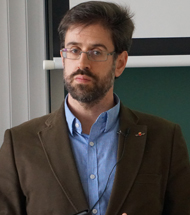The social influence virus
Professor Luis Ángel Díaz explains the social phenomenon produced by the arrival of the coronavirus in Spain.

Almost 70 years ago, Solomon Asch - one of the great researchers of social psychology - already said that an individual can issue a different response to the one he would issue by himself if he were not under the influence of the social environment and in favor of the majority opinion even in the case that the error of the majority was evident to the individual. That is, Asch (1952) concluded in his famous experiment on social influence that people are subject to the social pressure of the majority group and that this form of individual processing is hijacked by the majority thought, however erroneous or absurd it may be, in up to 30% of cases. A sort of scientific description of the tale of the naked king.
It seems that in the 70 years since Asch's experiment, little has evolved. The responses of massive hoarding of food, medicines and masks; the use of inappropriate medical services or the reduction of social interactions and excessive isolation of non-risk individuals are repeated once again, although, it must be said, for now in limited percentages.
It must be said that these responses of social conformism and irrational thinking, contribute to some environmental factors that must be taken into account in order not to criticize gratuitously that part of the citizenship that is dragged to this behavior subject .
Continuing with the theories on conformism (so that you can see that we follow a universal behavioral patron saint and nothing new) one of the factors that most affect this behavioral subject is social uncertainty. When the status is ambiguous, complex, novel or without clear rules of action, the individual feels an excessive tendency to accept the majority behavior since his judgment staff is considered by himself as incompetent. Indeed, this coronavirus crisis is a highly uncertain status , starting with the fact that little was known about this virus at the health level just 6 months ago and even today there are still doubts about its nature.
However, when speaking of social uncertainty, the influence of the information received by the population must be pointed out. Without wishing to be hurtful to the journalistic profession -since there are excellent examples of serious and professional communication-, there is as much objective information based on medical reports as subjective and alarmist opinions in the written and audiovisual media today. The use of headlines that sometimes do not reflect the totality of the news, the use of images or sounds that stimulate the emotional and irrational part and not the intellectual part of the receiver of the message, mixed with objective, technical and professional messages can generate a sensation of over-information and intellectual saturation that do not collaborate with the reduction of social uncertainty. And in some cases, and it must also be said, they can generate anguish and be source of hypochondriasis symptoms in some people with special psychological vulnerability. I will not comment on the production of "fake news" and "memes" because they are the responsibility of individuals and not so much of recognized organizations, although their effects can also be pernicious and influential, although to a lesser extent than the previous ones.
If we add to this real uncertainty the suggestion and imitation of our peers that also affects us because we live in a collective and in constant interaction with social networks, we have a perfect breeding ground for the virus of social anxiety to become much more contagious than the COVID-19 coronavirus itself.
Uncertainty may not only lead to an anxious, hypervigilant or compassionate attitude on the part of one part of the population, but, at the other extreme, health authorities, in their effort to inform in an objective and balanced manner, may find their work ineffective in the face of another highly polarized and defiant social group , with a skeptical and uncooperative attitude towards scientifically based preventive measures.
Therefore, an act of responsibility is required from all: from the public institutions and authorities to take the necessary action and prevention measures based on scientific criteria; from the media to transmit the information strictly necessary for the common purpose (the containment of the virus and social welfare); and from the population to consult and select the appropriate information and adapt their preventive behaviors as dictated by the expert committees.
In this way, the coronavirus crisis - real, current and, in its rightful measure, dangerous - will be overcome as humanity has managed to overcome its challenges so many times before: with serenity, with criteria goal and with a spirit of solidarity and group that does not forget the most vulnerable people, physically, economically and emotionally.
Published in: Diario de Navarra





